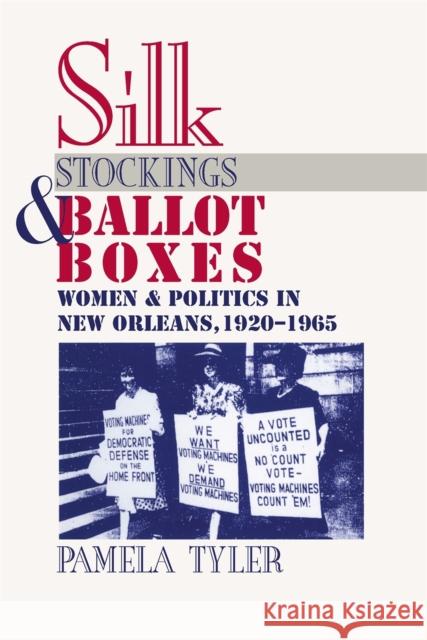Silk Stockings and Ballot Boxes: Women and Politics in New Orleans, 1920-1963 » książka
Silk Stockings and Ballot Boxes: Women and Politics in New Orleans, 1920-1963
ISBN-13: 9780820334554 / Angielski / Miękka / 2009 / 334 str.
"Silk Stockings and Ballot Boxes" is a narrative history of organized, politically active white women in twentieth-century New Orleans. Viewing their involvement as a link between pre-1920s progressivism and 1960s feminism, Pamela Tyler tells how these upper- and middle-class women sought and exercised power at the state and local levels through lobbying, fundraising, endorsements, watchdog activities, volunteer work, voting, and candidacy.
Beginning with an overview of New Orleans politics in the early twentieth century, Tyler looks at the presuffrage political activities of New Orleans women and discusses the relatively dormant state of women's political life in New Orleans in the 1920s. From there she traces, in the careers of the city's women leaders, a shift away from humanitarian, social justice issues toward politics. Subsequent chapters focus on Hilda Phelps Hammond and the Louisiana Women's Committee's crusade against Huey Long's political machine in the 1930s, Martha Gilmore Robinson and the nonpartisan activities of the Woman Citizen's Union and the League of Women Voters in the 1930s and 1940s, and the partisanship and direct political influence of the Independent Women's Organization in the 1940s and 1950s. The final chapters consider Martha Gilmore Robinson's unsuccessful bid for a seat on the New Orleans city council in 1954 and the civil rights activities in the 1950s and 1960s of Urban League stalwart Rosa Freeman Keller, the most effective white liberal of her time in New Orleans.
Throughout, Tyler places her subjects and their stories in the context of such national trends and events as the Depression, World War II, McCarthyism, and the civil rights movement. She discusses, for example, the New Orleans League of Women Voters' purge of suspected communist sympathizers in 1947-48 and the involvement of a coterie of women's organizations in community efforts during the public school integration crisis from 1959 to 1961. Tyler also discusses the insularity of New Orleans society, the limiting effects of race and class consciousness on many of her subjects, and the postwar decline in the domination by elites of the women's political scene in New Orleans.
Though neither liberals nor feminists, the women Tyler portrays worked within existing social norms and political frameworks to challenge male hegemony in public life and embrace greater individual freedom and participation in government. Filled with previously untold, or only partially told, stories about some of Louisiana's most memorable political figures--female and male--"Silk Stockings and Ballot Boxes" will broaden our views on southern activism.











